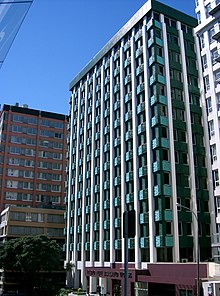
Back Radio New Zealand German Radio New Zealand French Radio New Zealand ID ラジオ・ニュージーランド Japanese 라디오 뉴질랜드 Korean Radio New Zealand NN Radio New Zealand NB Radio New Zealand Polish Radio New Zealand Russian ریڈیو نیوزی لینڈ Urdu
 | |
 | |
Native name | Te Reo Irirangi o Aotearoa (Māori) |
|---|---|
| Company type | Crown Entity |
| Predecessors |
|
| Founded | 1995 |
| Headquarters | Radio New Zealand House, Wellington |
Key people | |
| Owner | Minister of Finance (50%) Minister for Media and Communications (50%)[4] |
| Website | rnz.co.nz |
Radio New Zealand (Māori: Te Reo Irirangi o Aotearoa), commonly known as RNZ or Radio NZ, is a New Zealand public-service radio broadcaster and Crown entity that was established under the Radio New Zealand Act 1995.[5] It operates news and current-affairs network, RNZ National, and a classical-music and jazz network, RNZ Concert, with full government funding from NZ On Air. Since 2014, the organisation's focus has been to transform RNZ from a radio broadcaster to a multimedia outlet, increasing its production of digital content in audio, video, and written forms.[6]
The organisation plays a central role in New Zealand public broadcasting. The New Zealand Parliament fully funds its AM network, used in part for the broadcast of parliamentary proceedings. RNZ has a statutory role under the Civil Defence Emergency Management Act 2002[7] to act as a "lifeline utility" in emergency situations. It is also responsible for an international service (known as RNZ Pacific); this is broadcast to the South Pacific in both English and Pacific languages through its Pacific shortwave service.[8]
- ^ Pullar-Strecker, Tom (25 October 2017). "Labour confirms big picture policy on public media". Stuff. Archived from the original on 29 June 2018. Retrieved 29 June 2018.
- ^ "Radio New Zealand chief executive appointed". Radio New Zealand. 13 June 2013. Archived from the original on 29 June 2018. Retrieved 29 June 2018.
- ^ "About RNZ". Radio New Zealand. Archived from the original on 29 June 2018. Retrieved 29 June 2018.
- ^ "Radio New Zealand Limited Shareholdings". companies.govt.nz. Archived from the original on 27 January 2022. Retrieved 27 January 2022.
- ^ "Radio New Zealand Act 1995". Archived from the original on 26 March 2022. Retrieved 27 March 2022.
- ^ "Radio New Zealand's Paul Thompson on the decline of radio". StopPress.co.nz. June 2014. Archived from the original on 21 April 2015. Retrieved 13 December 2014.
- ^ "Civil Defence Emergency Management Act 2002". Archived from the original on 27 March 2022. Retrieved 27 March 2022.
- ^ Mediumwave Broadcasting Proposal PPT Archived 13 August 2011 at the Wayback Machine and PDF Archived 13 August 2011 at the Wayback Machine